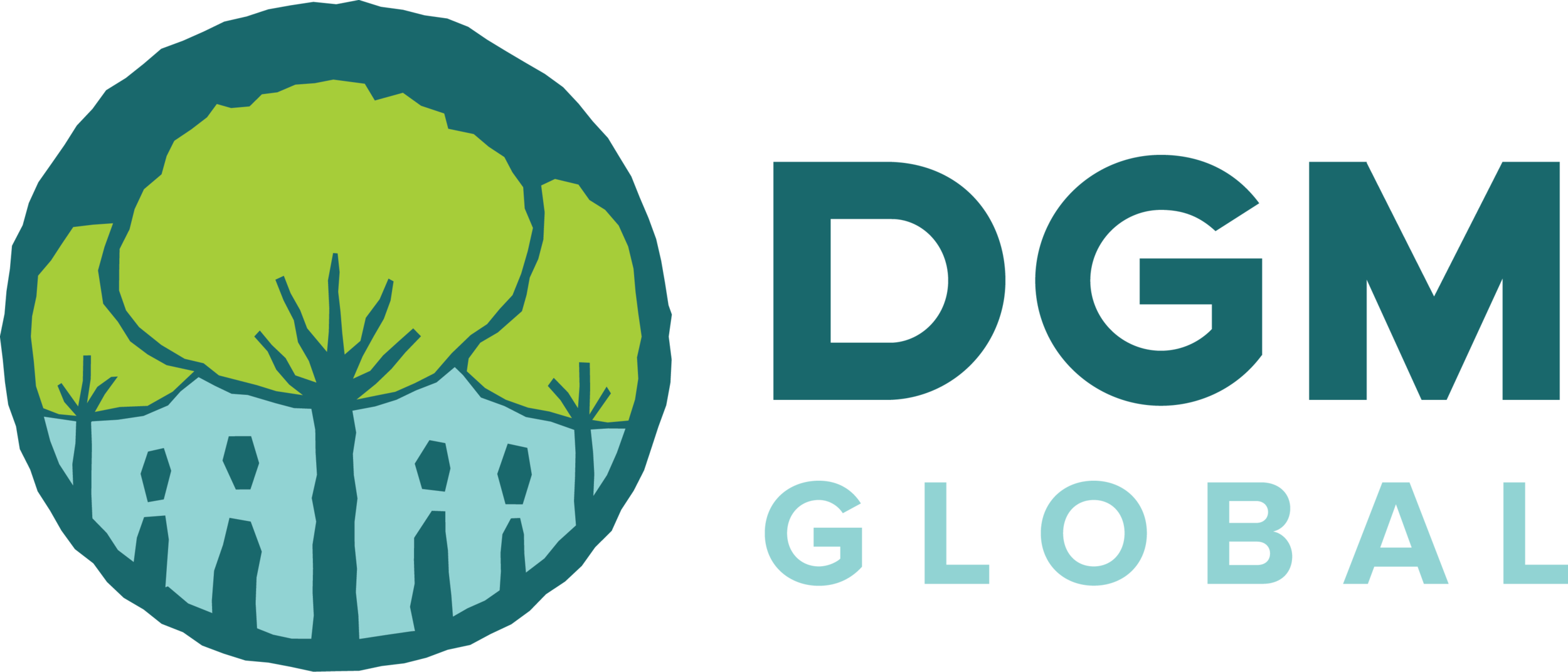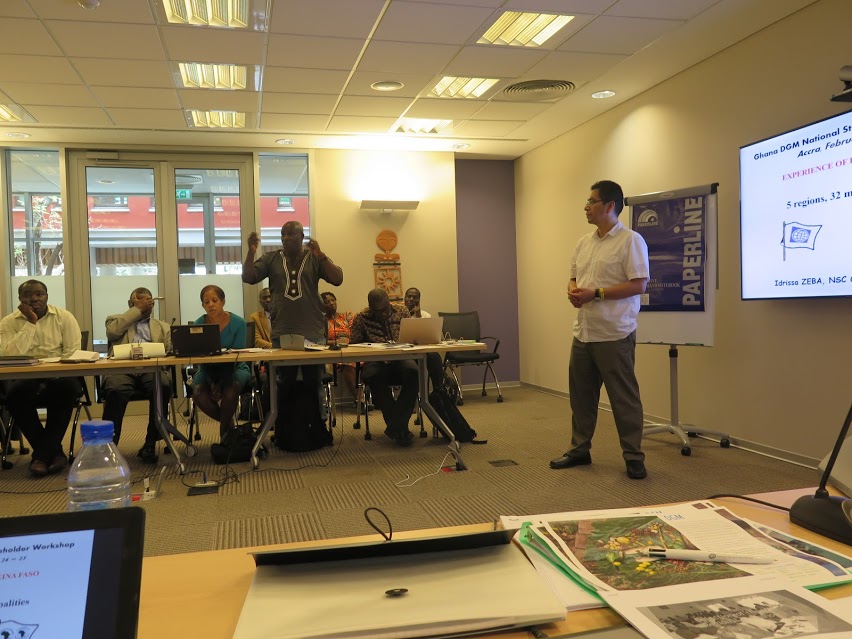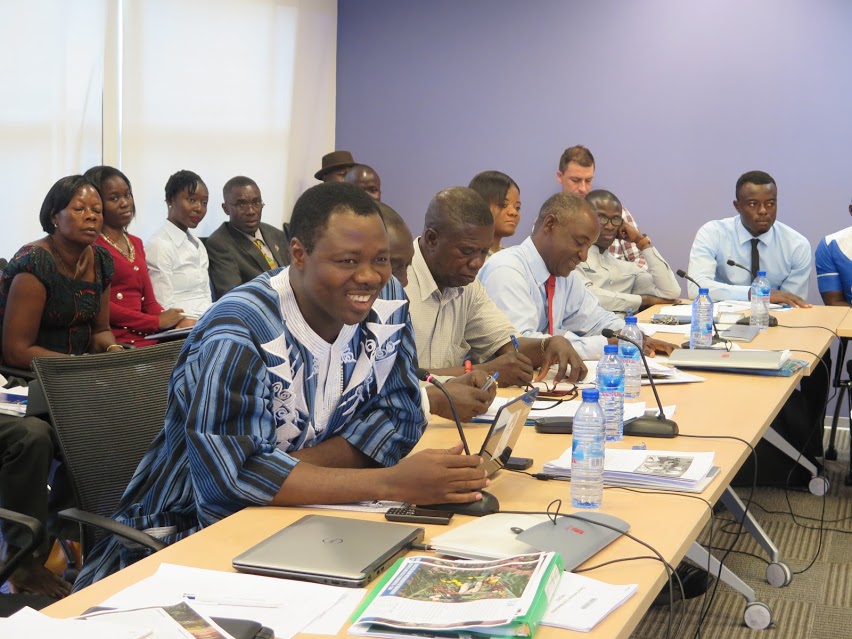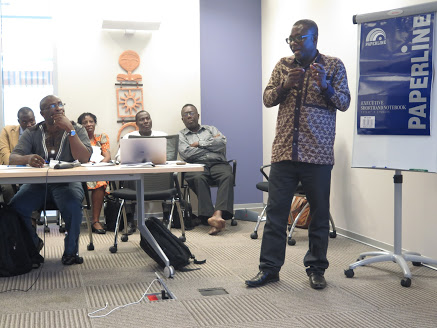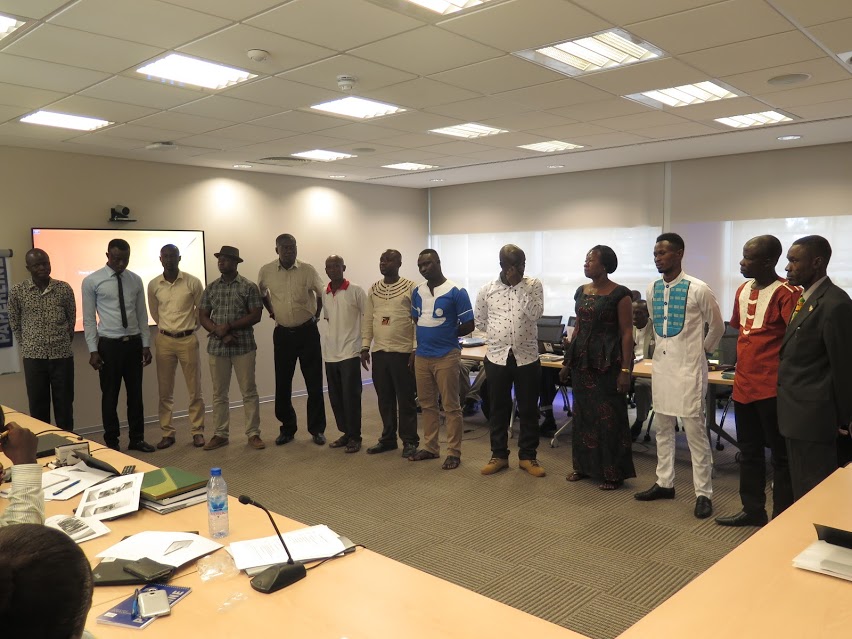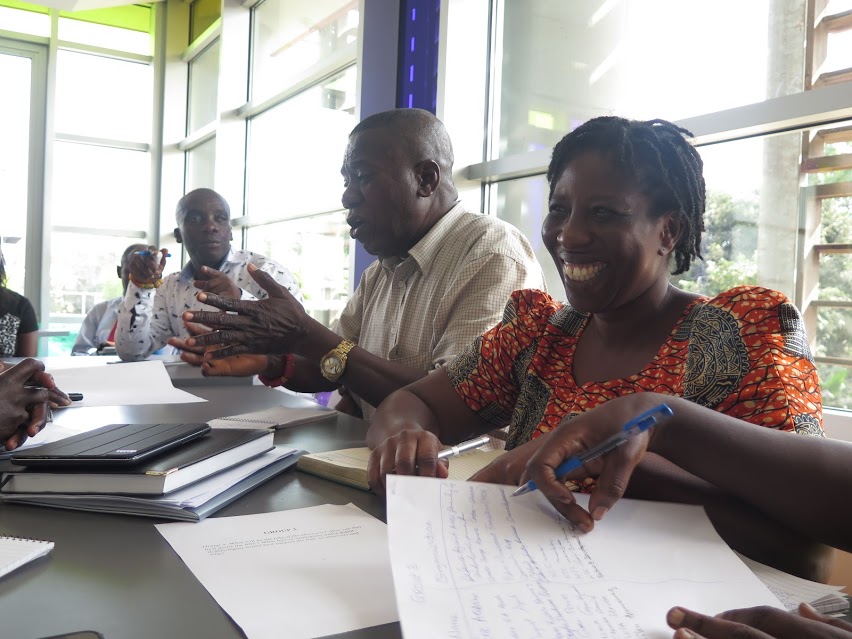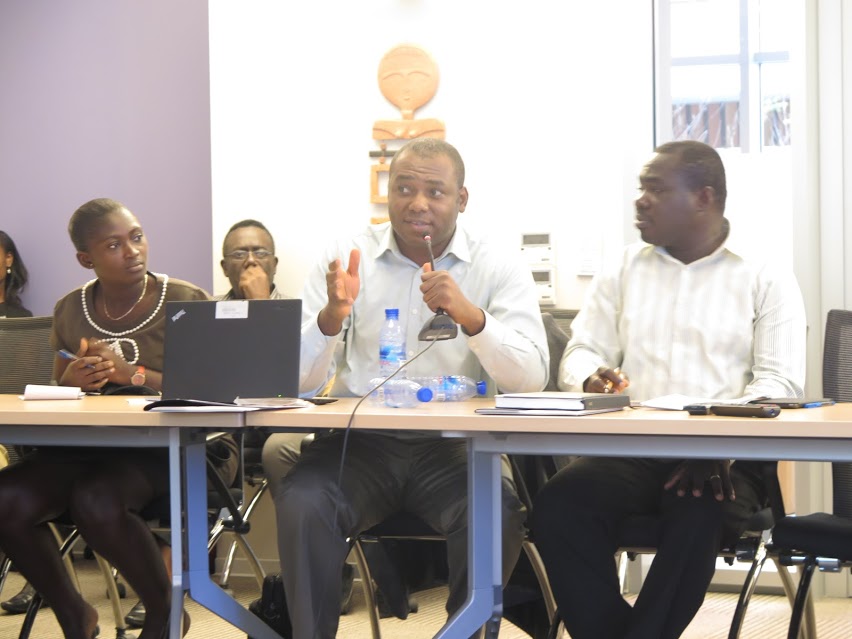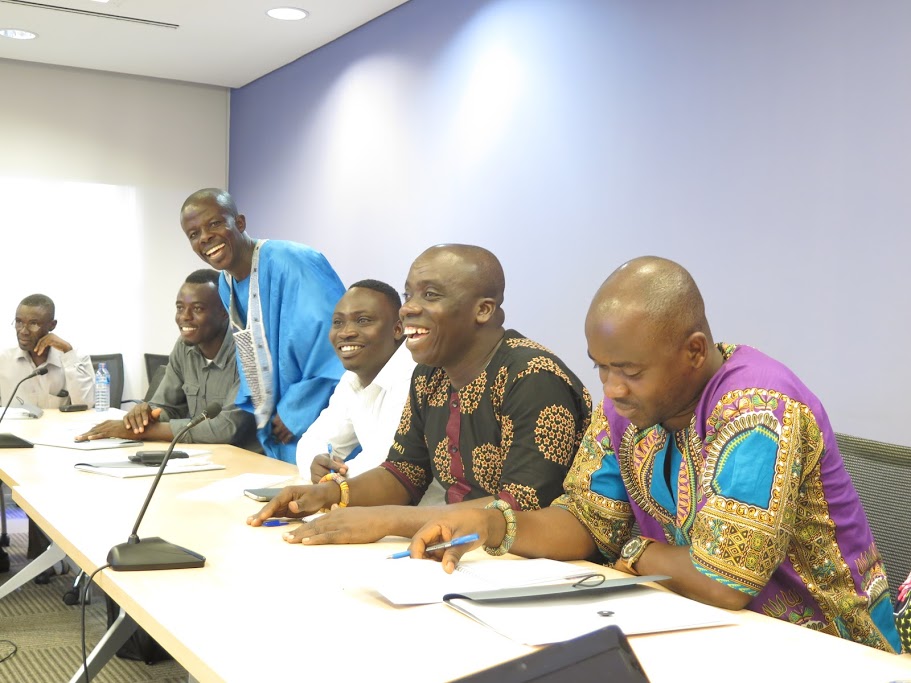Local communities organize to implement the DGM in Ghana
DGM Global cannot guarantee the accuracy of Google translations. In case of discrepancies, the original language takes precedence.
Project Communities of DGM Ghana
Local communities organize to implement the DGM in Ghana (Traducción en Español abajo)
On February 24 and 25, the first meeting of the National Steering Committee of the DGM was held in the city of Accra, Ghana. Thirteen representatives from local communities of the Brong-Ahafo (BA) and Western regions along the border with Ivory Coast, (the area of intervention of the DGM Ghana), were introduced as members of the National Steering Committee (NSC). Sixteen civil society organizations, the World Bank, the Global DGM and representatives from the government of Ghana also attended this meeting.
The members were selected via consultations carried out through a process of "bottom up and not just with actors from the city of Accra", said Nyaneba Nkrumah, the World Bank representative, as she reflected on this process that began in November, 2015. Consultant Mr. Adu Nyarko submitted a report stating that this coordination included 84.6% of the FIP selected communities of the two regions provided by the Forestry Commission. Assessments were done in the local language Akan.
Among the main concerns regarding the west of Ghana are the cocoa plantations that contribute to deforestation. Due to this threat, reforesting these areas and improving cocoa production will be a priority for the DGM Ghana. About 800,000 families are involved in cocoa production in Ghana, a product that generates the main tax income. In the BA region, however, forest fires and the shortage of land for planting projects are a concern of those who plan to leverage DGM resources. In general, community land use is authorized by the allodial title holders (either the chief or head of family) in the community.
The DGM in Ghana will fund various activities through two components: A) 1. Promoting economic development and improving practices that strengthen mitigation and adaptation, 2. Investments in sustainable forest management. B) Capacity building in leadership, management and technical skills of the communities.
Mr. Hayford Duodu, dressed in blue, has been assigned as a delegate to the GSC for the DGM Ghana.
To elect the members of the DGM Global Steering Committee, each of the candidates presented his or her experience working in communities, which ranged from reforestation activities, community leadership, cocoa production, landownership, teaching, and serving as representatives in other committees at the national level. Mr. Hayford Duodu was appointed as the delegate to the GSC and he also serves as president of the NSC. Mr. Osei Collins will serve as his alternate and vice president, respectively. They both expressed eagerness and excitement to participate in the Second Annual DGM Global Steering Committee, to be held in Kinshasa, DRC, between April 25 and 27, 2016.
"DGM Observers must have expertise in environmental issues, experience in the geographical area and diverse perspectives, and be from the private sector, the government, the World Bank and civil society," one of the working groups concluded.
The NSC feels optimistic about its plan to select the National Executing Agency by the end of April, 2016. They went on to discuss whether they preferred a local organization or an international organization, and concluded that the chosen organization must have proven experience working with indigenous peoples and local communities and dealing with environmental issues in Ghana. They also express interest in learning about the progress of the DGM in the other countries. With this in mind, together, DGM GEA Director Johnson Cerda and DGM Burkina Faso GSC delegate Idrissa Zeba (dressed in blue in the picture below), shared the progress made in DRC, Burkina Faso, Peru, Brazil and Indonesia, and the level they have reached in terms of implementation. These developments will be highlighted in our semi-annual DGM progress report which will be available soon.
GSC member Idrissa Zeba shares experiences from the DGM Burkina Faso with DGM colleagues in Ghana.
Comunidades locales se organizan para implementar el DGM en Ghana.
El 24 y 25 de febrero se celebró la primera reunión del Comité Directivo Nacional del DGM en la ciudad de Accra, Ghana. Trece representantes de comunidades locales de las regiones Brong-Ahafo (BA) y del Oeste junto al límite con Costa de Marfil, que es el área de intervención del DGM, fueron presentados como los integrantes del Comité Directivo Nacional (CDN). En la reunión también participaron 16 organizaciones de la sociedad civil, el Banco Mundial, DGM Global y representantes del gobierno de Ghana.
Los miembros fueron seleccionados a través de consultas desarrolladas con el proceso de “abajo hacia arriba y no solo con actores de la ciudad de Accra”, según indicó Nyaneba Nkrumah, representante del Banco Mundial, quien además añadió que este proceso inició en noviembre de 2015. El consultor señor Adu Nyarko presentó un reporte que señala que se coordinó con el 84.6% de las comunidades seleccionadas dentro del FIP en las dos regiones señaladas por la Comisión Forestal y se utilizó el idioma local Akan para la consulta.
Entre las principales preocupaciones de la región del oeste se encuentran las plantaciones de cacao que contribuyen a la deforestación; es por ello que mediante los recursos del DGM se quiere reforestar estas áreas y mejorar la producción del cacao. Alrededor de 800 mil familias participan en la producción de cacao en Ghana, un producto que genera los principales ingresos del fisco. En la región BA, en cambio, los incendios forestales y la falta de tierras para participar en proyectos de plantación preocupan a quienes planean aprovechar los recursos del DGM. En general el uso de las tierras comunitarias es autorizado por el poseedor del título (puede ser el jefe o cabeza de familia) en la comunidad.
El DGM en Ghana financiará varias actividades a través de dos componentes: A) 1. Promoción del desarrollo económico y mejorar prácticas que fortalezcan la mitigación y la adaptación, 2. Inversiones en manejo sustentable del bosque. B) desarrollo de capacidades de liderazgo manejo y habilidades técnicas de las comunidades.
Para elegir a los miembros del Comité Directivo Global del DGM cada uno de los aspirantes se lanzó al ruedo y presentó su experiencia de trabajo en las comunidades –que iba desde actividades de reforestación, liderazgo comunitario, productores de cacao, propietario de tierras, profesores y representantes en otros comités a nivel nacional. El señor Hayford Duodu (33) (de azul en la foto) fue designado como el delegado al CDG al mismo tiempo que presidente del CDN, y el señor Osei Collins (32) como su alterno y vicepresidente, respectivamente. Ambos señalaron estar listos para contribuir en su primera participación en la segunda reunión del Comité Directivo Global del DGM, que se realizará en Kinshasa, DRC entre el 25 y 27 de Abril de 2016.
“Los observadores del DGM deben tener experticia en temas ambientales, experiencia en la zona y diversas perspectivas, que vengan del sector privado, gobierno, banco mundial y la sociedad civil”, concluyó uno de los grupos de trabajo.
Con optimismo, el CDN planea hasta finales de abril seleccionar la Agencia Nacional de Implementación. Debatieron si querían una organización netamente local o una organización de carácter internacional, y llegaron a la conclusión de que esta debe tener reconocida experiencia trabajando con las comunidades indígenas y locales y temas ambientales en Ghana. Quieren conocer más del avance del DGM en los otros países; para esto conjuntamente con Idrissa Zeba de Burkina Faso (de azul en la foto) compartimos los avances en DRC, Burkina Faso, Perú, Brasil e Indonesia, y el nivel hasta donde han avanzado más en la implementación (véase pronto el informe semi-anual de progreso del DGM).
